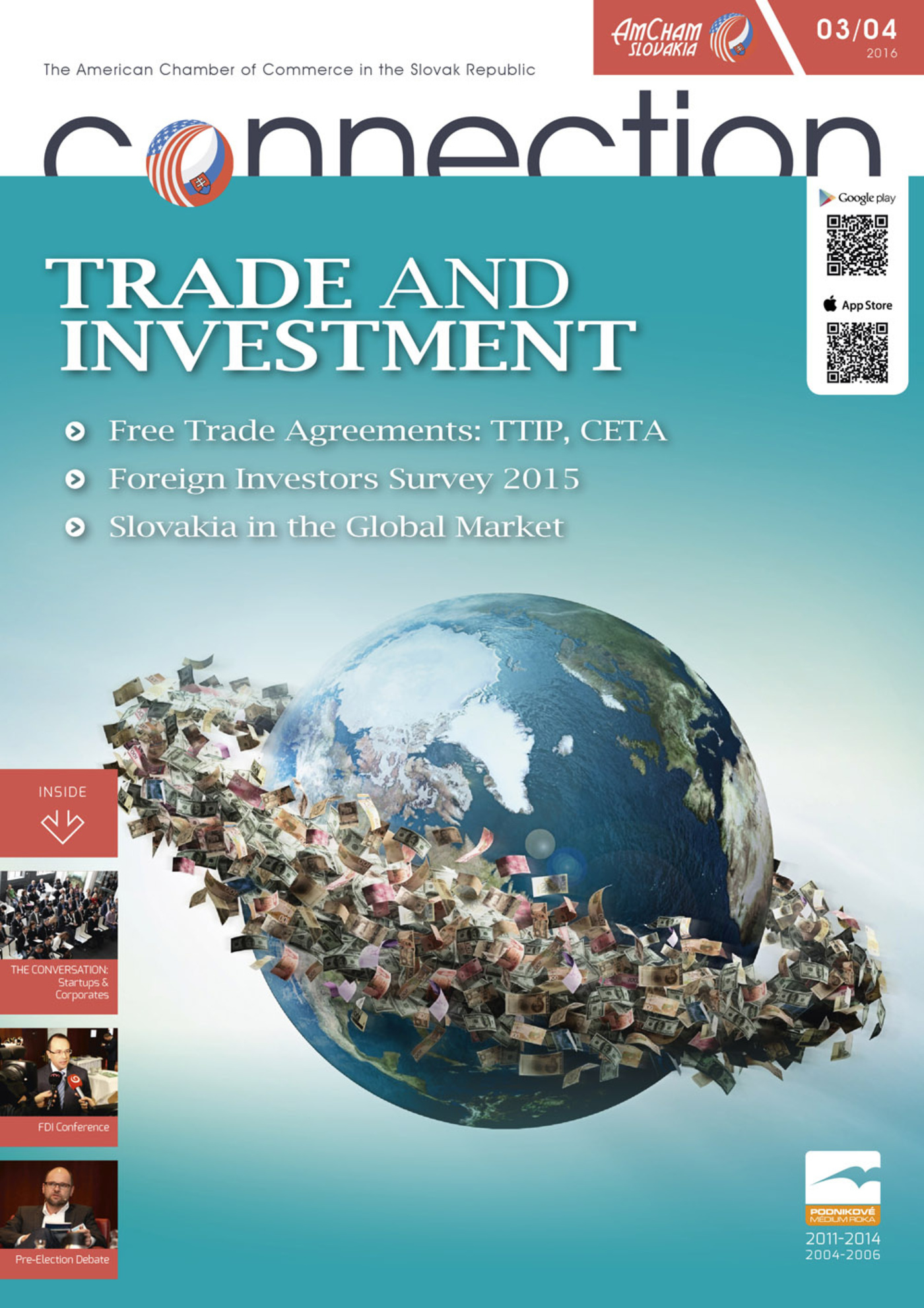Today, we’re living in a global economy and our world is becoming increasingly interconnected. AT&T’s customers are doing business in virtually every country and territory. We serve millions of business customers around the world including most of Europe. In Slovakia, AT&T employs a workforce that helps support our multinational customers manage three rising trends: going mobile, using the cloud, and expanding their operations around the world.
We are entering a world of ubiquitous connectivity. For our connected world to develop, technology at every scale needs to work together. The underlying networks that allow your car to talk to your home, or let you monitor a shipment and its condition as it travels around the globe – requires significant investment in the connection and platform to provide services. The importance of flexible and interoperable rules and policies is crucial to ensure that services are available on a consistent basis while maximizing economies of scale. The simplest and straightforward way to achieve flexible and interoperable polices it through trade agreements.
Free trade agreements can remove digital barriers by:
- Providing Market Access – opening the doors for companies to offer services with 100% market access promoting investments in new services.
- Ensuring Cross Border Data – allowing data to efficiently flow across borders. Today businesses in every industry need information to move efficiently so they can compete.
- Preventing Localization Requirements – ensuring companies are not required to build facilities in one country – and unnecessary costs are not incurred to do so – because in a global economy, consumers and businesses benefit from the economies of scale and efficient flow of information around the world.
In 2011, the U.S. and EU developed a set of non-binding trade related principles for ICT services that provide guideposts for digital economy issues. These have been negotiated and agreed to, and address everything from the free flow of information across borders and transparency in legislation and regulation to the efficiency of spectrum allocation and the independence of regulatory authorities. In fact, the recently concluded Trans-Pacific Partnership trade agreement builds on these EU-US ICT principles. The agreement also included specific provisions on e-Commerce to ensure consumers and businesses, especially for the many small businesses that now rely on e-Commerce to sell internationally, realize the benefits of the digital economy. The proposed trade commitments on data flows and facilities localization will revolutionize the way we provide services and sell in an ever more interconnected world.
TPP addresses:
- Enabling Cross-Border Data Flows: ensuring the free flow of the global information and data that drive the Internet and the digital economy, subject to narrowly tailored legitimate public policy objectives such as personal information protection.
- Preventing Data Localization: not require that companies build data centers to store data as a condition for operating in the market.
- Protecting Consumers: consumer protection laws related to fraudulent and deceptive commercial activities online and to ensure that privacy and other consumer protections can be enforced in TPP markets.
- Driving Commerce: cooperate to help small- and medium-sized business take advantage of electronic commerce.
- Promoting Interoperability: cooperation on policies regarding personal information protection, online consumer protection, cybersecurity threats and cybersecurity capacity.
At AT&T, our customer’s privacy is of upmost importance and as you can see from the TPP, free trade agreements can protect customer’s privacy without limiting the flow of data. We can and should protect them while at the same time not foregoing the benefits of new global technologies that will help grow our economies.
Cross-border data flows between Europe and the U.S. are the highest in the world. For the digital economy to prosper, we need some level of interoperability of rules across national boundaries that trade agreements can deliver. Specifically, we need to support:
The Trans-Atlantic Trade and Investment Partnership (TTIP) trade agreement for the EU and US. Negotiators have expressed a goal to conclude negotiations in late 2016. Despite sluggish economies on both sides of the Atlantic, the US and Europe remain each other’s most important markets. Research predicts1 that an ambitious TTIP deal would increase the size of the EU economy around €120 billion (or 0.5% of GDP) and the US by €95 billion (or 0.4% of GDP).
The Trade in Services Agreement (TISA) is currently being negotiated2 by 23 members of the World Trade Organization, including the EU and US. The participating countries account for 70 percent of world trade in services. This agreement will promote fair and open competition across the services sector. TISA negotiations are making steady progress with a stated goal of completion by the end of 2016.
We encourage the successful conclusion of TTIP and TISA negotiations. Europe and the US can achieve great things together. For our societies and our economies, if we can work together on this roadmap for growth and investment.
As AT&T’s Senior Executive Vice President External and Legislative Affairs, Jim Cicconi, noted in an article in New Europe3: “The upcoming year – 2016 – will be intense both from a political and from a trade perspective. Given its vital importance, I would expect the United States and Europe to do whatever it takes to get a trade and investment deal in place between the two largest consumer markets in the world. Our ability to do this will be a key factor in whether we can look back at this time next year and pronounce 2016 successful.”
________
1 http://trade.ec.europa.eu/doclib/docs/2013/september/tradoc_151787.pdf
2 http://www.ustr.gov/about-us/press-office/blog/2014/january/2013-year-review-look-back-ustr%E2%80%99s-work-support-jobs-and-econ
3 http://neurope.eu/article/building-on-the-us-european-relationship/
Gabriel Galgóci, Director Client Network Operations Management & Slovakia Country General Manager, AT&T Global Network Services Slovakia



Follow us